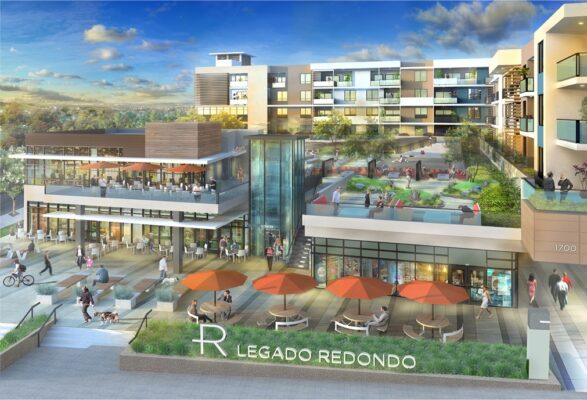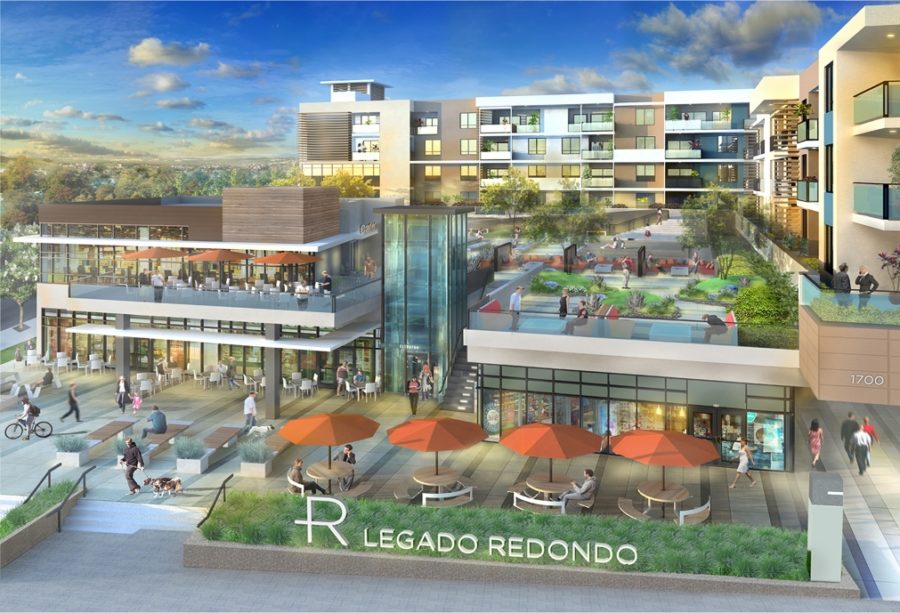Redondo Beach City Council to consider mixed-use development moratorium

The Legado Redondo project, seen here, would be affected should the Redondo Beach City Council approve a moratorium on mixed-use development. Image courtesy City of Redondo Beach.
A 3-2 majority of Redondo Beach’s City Council voted for city staff to write a resolution that would put a temporary halt on building new mixed-use projects throughout the city. But that proposal itself may prove to be a futile, symbolic gesture if a fourth council member isn’t swayed to approve it when it returns to council in two weeks.
A moratorium on the development of mixed-use projects in Redondo Beach has been floated, in recent months, during public hearings discussing the pending Legado Redondo project at 1700 S. Pacific Coast Highway and the recently approved SeaBreeze Plaza project at 1914-1926 S. Pacific Coast Highway.
Though specific problems were raised by opponents for both sites, many of the same themes cropped up during their discussions. Area residents worry that mixed-use development is too dense for the community, and that increases in traffic brought about by the projects would cause significant traffic issues along PCH during rush hour conditions.
“Simply, [mixed-use] is an association of uses forming an important relationship with one another,” said Community Development Director Aaron Jones. According to city staff reports, the goals of mixed-use in Redondo are to revitalize commercial areas and to help meet required housing development needs without hurting established neighborhoods.
Redondo Beach is required by state law to provide sites for potential housing developments based on what the Southern California Association of Governments considers to be the city’s fair share of the region’s needs. In 2013, that share was determined to be 1,397 new housing units by 2021. That figure is the highest by far among the Beach Cities, and fourth-highest in the region behind Carson, Santa Monica and Torrance, as District 3 Councilman Christian Horvath noted.
According to staff, residents aren’t wrong regarding density concerns. “Mixed Use requires higher density,” the staff report noted, in a section addressing problems with mixed-use, noting that “low-density Mixed Use developments are rare.” Redondo Beach allows for a maximum of 35 residential units per acre in its mixed-use zones.
“Mixed-use in Redondo Beach, in my view, is broken,” said District 2 councilman Bill Brand. “Thirty-five units per acre is too much; it’s a health and safety issue,” he said, citing a figure that Redondo is the state’s fourth most dense city with a population of more than 65,000 residents in 6.2 square miles. Calling the city’s Regional Housing Needs Allocation “unfair,” Brand cited potential concerns with traffic, air quality and overpopulation of schools as reasons the moratorium was necessary.
“Those are great anecdotal points, but I haven’t seen any data that supports those points,” said District 5 councilwoman Laura Emdee. “If I’m to read this right, to do a moratorium, we have to have specific, adverse impacts — significant, quantifiable, direct and unavoidable. With traffic, how would we quantify that?”
Brand cited the city’s many failing “Level of Service” grades for its intersections, particularly along Pacific Coast Highway, as a “quantifiable impact.”
An initial moratorium would last 45 days. To extend that to a two-year moratorium, City Attorney Michael Webb said, council would have to have quantifiable findings of a negative public impact on Mixed Use development — and that any moratorium would have to be approved by a 4-1 vote.
Brand’s direction to staff to come back with a resolution creating a 45 day moratorium on Mixed Use zones in the city passed, 3-2.
“You absolutely have the right to do this,” Webb said. “But know that it’s doomed to failure of only three of you ask me to do it. Unless anyone changes their mind, a moratorium requires four votes.” ER


